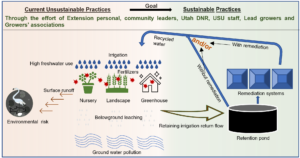Project Overview
Commodities
Practices
- Education and Training: demonstration, display, extension, workshop
Proposal abstract:
Lesser precipitation, increasing population and extreme drought is already impacting the nursery and landscape industry in Utah. Current uncertainties in water availability and strict water regulations demand nursery and landscape growers to look for alternative irrigation approaches. Capturing and reusing irrigation return flow as an alternative source of irrigation is common in many parts of the United States but is very unusual in Utah. Recycling irrigation return flow can increase the sustainability of the nursery and landscape industry in two major ways 1) reduce the amount of fresh water used for irrigation and 2) lower irrigation runoff to watershed areas hence reducing non-point source (agrochemical) pollution. There are numerous resources to incorporate a water recycling approach in nurseries, which were developed as an outcome of several research projects outside Utah. Those resources can be modified, customized, and outreached to Utah's landscape and nursery industry to incorporate a water recycling approach in Utah’s nursery and landscape industry. Through this project, we will train and educate state outreach personal from Utah State University Extension, Utah Department of Natural Resources (Utah- DNR), United States Department of Agriculture - Natural Resources Conservation Service (USDA-NRCS) and nursery and landscape growers on incorporating a water recycling approach in the landscape and nursery industry. In turn, those trainees will then go to their respective jurisdiction/territory to outreach their knowledge to persuade and promote water recycling approach in the nursery and landscape industry. It is highly likely that in near future, Utah will have harsher water regulations. If the footsteps of California and Arizona are followed, water recycling will be mandated in the nursery and landscape industry. Therefore, this project will also create and archive resources on water recycling and form a team of specialists to tackle water recycling questions and problems in Utah.
Figure 1
Project objectives from proposal:
Detailed Objectives:
- Determine the barrier to adoption for retaining and recycling water in nursery and landscape industry.
- Educate extension personal, water professionals and lead growers on the importance of implementing water recycling systems in the nursery and landscape industry.
- Educate and train professionals in the nursery and landscape industry on implement successful water recycling systems.
- Empower agricultural and water professionals to disseminate information in communities across Utah.
- Establish a team of experts to tackle water recycling questions.
We will accomplish our objectives by conducing the following actions:
- Determining the barrier to adoption for retaining and recycling water in nursery and landscape industry through in-person and virtual meetings with landscape and nursery professionals, growers, county extension personals and home gardeners.
- Conducting participatory workshop, field demonstration and round table discussion of water recycling systems in a real nursery environment along with producing videos and instruction materials on how to integrate runoff recycling system in a nursery.
- Conducting webinars (10 in total) by inviting researchers and extension personals expert in their field on how to adopt water recycling and archiving complete information in a free and easily accessible online portal. The topics of webinars with expected speaker is provide in the timeline chart under method and timeline section.
- Developing fact sheets, short videos and journal articles on water recycling for ornamental crop production.
- Creating a GLOW (Growing Landscape plants and Ornamentals Wisely) team that will address the needs of Utahns and beyond on questions and concerns related to water recycling.
- Evaluating the willingness of stakeholders to adopt to water recycling before and after the project.
